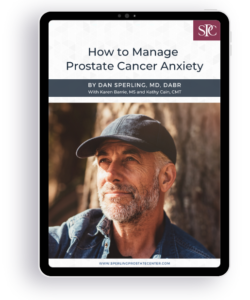Originally published 7/30/2014
Are you familiar with the word asymptomatic? If you are, it may be due to public information about the COVID pandemic. Many people are walking around without even knowing they have it, because they don’t experience any symptoms, meaning active signs like fever, sore throat, cough, etc. According to MedPage Today (May, 2022), “A significant proportion of COVID-19 transmission is asymptomatic or presymptomatic — potentially as high as 60%…” However, this doesn’t mean that such unwitting virus victims are getting off scot-free. New evidence suggests that even asymptomatic people—that is, no symptoms—may still have harm going on in their lungs.
A similar thing is happening to men with asymptomatic PCa. While going about their daily routines, there damage may be slowly building because early PCa rarely causes symptoms. Symptoms don’t necessarily mean PCa because “… there is significant crossover in symptoms between prostate cancer and benign conditions affecting the prostate such as benign prostatic hypertrophy (BPH) and prostatitis, making it very challenging to distinguish between them on the basis of symptoms.”[i] (Any urinary or pelvic symptoms should still be checked by a doctor.)
Fortunately, there is a “rapid test” to screen for PCa, just as there is for COVID. Unlike the virus, however, you can’t just pop in to the drugstore and buy a test kit. You need a PSA blood test. Despite several years of confusion and controversy over PSA screening, it does save lives! A word of caution: abnormally high PSA does not necessarily mean PCa. So, how can you know if it’s a false alarm? The answer is simple: multiparametric MRI, together with biomarkers, can rule significant PCa in or out.
Take an extra minute to review the symptoms below. There’s a saying in the PCa patient community: by the time you have symptoms, the horse may already have left the barn. Early detection means finding the disease well before it reaches that stage, so don’t neglect your annual PSA test.
Different types of cancers are known to be “silent killers” since they are usually detected only after they have reached the later stages. But that doesn’t have to be the case every time – especially for prostate cancer. Although this type of cancer may not have any signs and symptoms during its early stages, it is best to know what signs and symptoms it may cause later on.
More Advanced Signs and Symptoms of Prostate Cancer
Watch out for the following manifestations of prostate cancer in order to address it as soon as possible:
- Weak or slow urinary stream leading to trouble passing urine or having the need to urinate often, which happens especially at night
- Having blood in the urine, also known as hematuria
- Having blood in the semen
- Having problems getting an erection, or impotence
- Numb sensation in the legs or feet or discomfort in one’s pelvic area
- Pain in the back, hips, or chest due to the spreading of cancer to the bones of the body
- Loss of control over the bladder or bowel as the prostate cancer continuously presses on the spinal cord
These symptoms may also be caused by other diseases such as benign prostatic hyperplasia and cancer may not have caused them. Even so, it is still important to consult a doctor as soon as these symptoms are present to identify the real cause and receive treatment right away.
If you are at high risk for prostate cancer, it is best to have your prostate checked today. Call us at (877) 605-2737 to schedule an appointment with prostate cancer expert Dr. Sperling. We look forward to hearing from you!
Download Our Free Ebook: “How to Manage Prostate Cancer Anxiety”

Don’t let anxiety over prostate cancer run you. Instead, learn how you can take charge and empower yourself to manage stress and boost positive treatment outcomes with our “first aid kit” of practical tips and tools.
NOTE: This content is solely for purposes of information and does not substitute for diagnostic or medical advice. Talk to your doctor if you are experiencing pelvic pain, or have any other health concerns or questions of a personal medical nature.
References
[i] Merriel SWD, Funston G, Hamilton W. Prostate Cancer in Primary Care. Adv Ther. 2018 Sep;35(9):1285-1294. doi:10.1007/s12325-018-0766-1.


